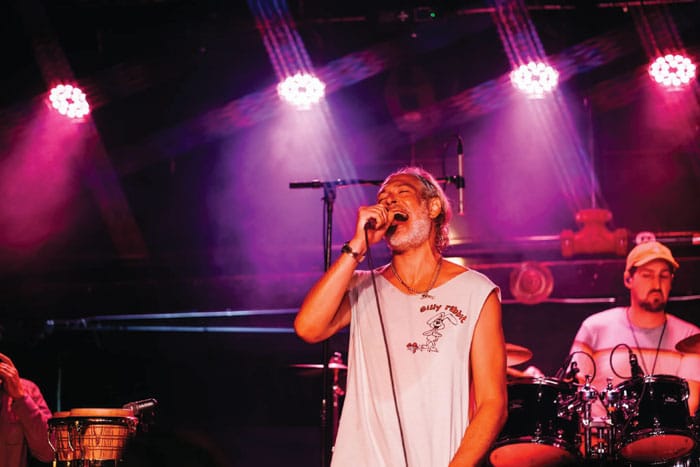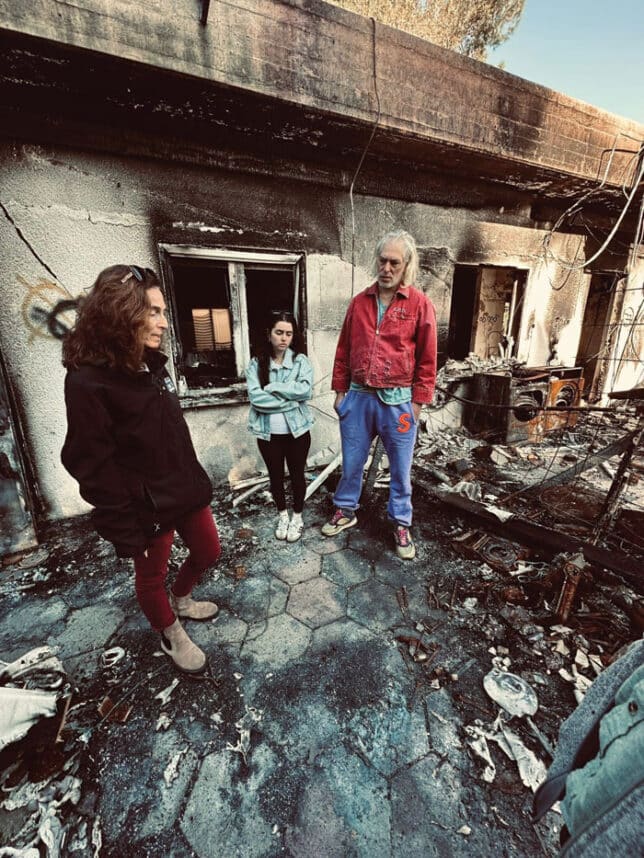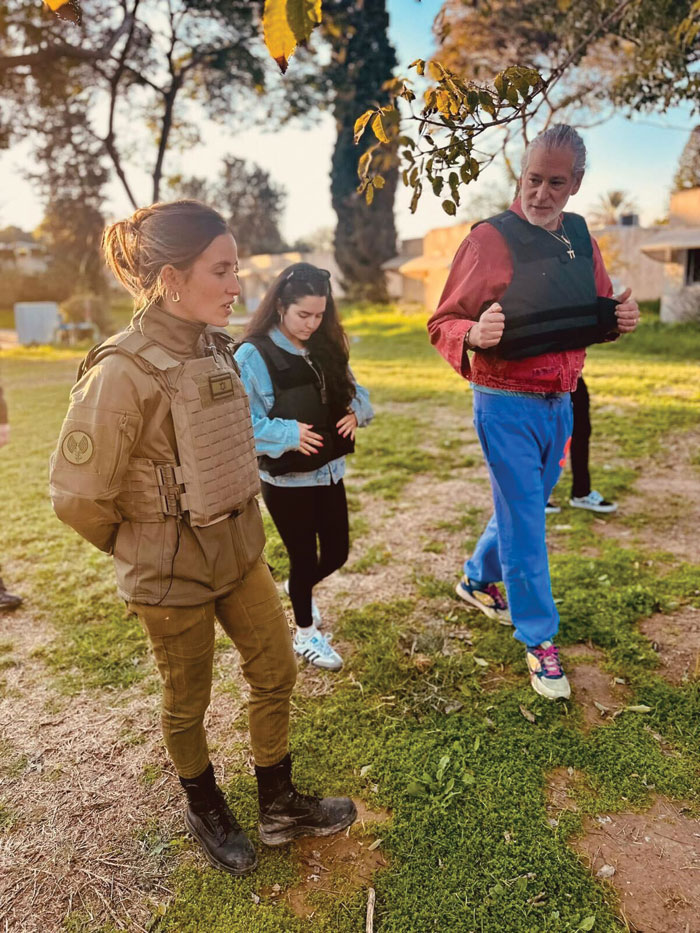
Matisyahu sat on a white plastic chair, underneath a set of string lights, his feet planted on the dirt below him. Wrapped in an Israeli flag on a cold night in Israel, he sang with a guitarist accompanying him.
Sometimes I lay under the moon
And thank God I’m breathin’
Then I pray, “Don’t take me soon
‘Cause I am here for a reason”
The Golani Brigade soldiers sang along with Matisyahu at the army base; they’d just come back from fighting, and he was there to uplift their spirits.
“I felt so humbled to perform for them,” Matisyahu said. “It was a real privilege and a beautiful experience for me.”
The Jewish singer had come to Israel on a trip put together by the Maccabee Task Force, an organization that fights antisemitism and anti-Zionism on college campuses. It had been five years since Matisyahu was in Israel, but it was time to go back and bear witness to the destruction, offering hope during a seemingly hopeless time. His son Laivy Miller, who is 18 years old and studying in yeshiva, put the idea into his head.
“He told me that after Oct. 7, when he came back to the United States for a little bit, he felt alone in the world,” Matisyahu said. “Being in Israel, he felt connected. That’s the gist of what everyone else was telling me and what I was seeing on social media. I decided to go.”
Reconnecting With His People
Matisyahu, born Matthew Paul Miller, burst onto the music scene in 2005 with the Top 40 hit “King Without a Crown.” Appearing on stage with a black, long beard and tzitzit, he called himself a Hasidic reggae singer. He prayed daily, attended synagogue, and wouldn’t perform on Shabbat. He was a star in the mainstream, as well as among Orthodox Jews, who appreciated the singer spreading a positive view of Orthodox Jews in popular culture.
Then, in 2011, Matisyahu announced that he’d shaved his beard and left Orthodox Judaism, writing, “At a certain point I felt the need to submit to a higher level of religiosity … to move away from my intuition and to accept an ultimate truth. I felt that in order to become a good person I needed rules — lots of them — or else I would somehow fall apart. I am reclaiming myself. Trusting my goodness and my divine mission.”
For over a decade, Matisyahu, a Grammy-nominated artist, focused on looking inward, on making music that was self-reflective. Though he’d taken a step back from religious Judaism, he kept the Jewish people close to his heart.
In 2015, he stood up to festival organizers in Spain, who, bowing to BDS pressure, told him he needed to sign a letter saying he supported a Palestinian state and wouldn’t bring up Israeli politics while performing. He refused, and eventually the festival was forced to apologize to him and let him play.
That same year, he played a concert in Jerusalem during a rise of stabbing attacks, stating at a press conference that it’s important for “American Jews like myself to come to Israel no matter what’s happening here.”
When Oct. 7 hit, Matisyahu felt that pull to lean into his Judaism again, to be there for his people in their time of dire need.
“After Oct. 7, it’s not religious per se, but there is this strange pull back to being Jewish and feeling Jewish, of wanting to be connected to other Jews and Israel and speaking out about what’s happening and writing songs about it.”
“Before Oct. 7, my focus had become less Jewish and more about my life and my music, my ups and downs, struggles, joy, pain, love and loss, which are all part of the human experience,” he said. “Initially, my music was very rooted in my Jewish experience, living as a Hasidic Jew and all of that. After Oct. 7, it’s not religious per se, but there is this strange pull back to being Jewish and feeling Jewish, of wanting to be connected to other Jews and Israel and speaking out about what’s happening and writing songs about it.”
Matisyahu jumped on social media, posting his support for Israel and videos of himself lighting Hanukkah candles with his daughter, putting up a mezuzah and donning tefillin. He went on Jewish podcasts and performed at Columbia University, in an event organized by the pro-Israel group Israel on Campus Coalition, as well as at the ICC’s Geller Fellowship Retreat in early January. About a week later, he traveled to Israel, posting a photo of himself in front of an El Al plane and captioning it “Jerusalem if I forget you … 100 days. We won’t forget you. #bringthemhomenow.”
Inspiring Those in Israel
As soon as Matisyahu landed, he went to the sites where the Nova, Kibbutz Nir Oz and Kibbutz Kfar Aza massacres occurred. He posted photos of the destruction on his Instagram, writing, “The Holocaust happened again here in my lifetime. To all of the Jews around the world who are afraid to speak up, it’s time to wake up or it will be too late.”
He talked to the families of the hostages and spoke with Nova survivors, hearing their stories.
“All of it was very intense,” he said. “The survivors played music for me.”
The singer filmed much of his experience for a music video he’s making for his new song, “Ascent,” which is about antisemitism. It includes footage of the Nova victims with yahrzeit candles behind them.
The singer filmed much of his experience for a music video he’s making for his new song, “Ascent,” which is about antisemitism. It includes footage of the Nova victims with yahrzeit candles behind them.
“I wrote the song after that Kanye stuff was going on,” Matisyahu said. “The video has all of this footage not only from Nova, but also antisemitism throughout the years. It’ll be a very powerful piece.”
When he was with the Golani soldiers and performed his song, “Live Like a Warrior,” he said he thought about the physical component, which was right in front of him.
“When I sing ‘Live Like a Warrior,’ I’m talking to fans who may have gone through different struggles, like anything from physical health issues to abuse to their own demons,” he said. “But singing for the soldiers and saying, ‘You’re a warrior,’ it’s very literal. It was an honor to be able to sing those words and perform for them.”
From there, Matisyahu played a few concerts in Israel and watched Laivy, also a musician, perform his first show in Tel Aviv. He surprised his son, showing up on stage and singing a duet with him.
“My son is in his yeshiva, and it’s good for him,” the proud father said. “He and his friends have community and support. His fans were singing his songs and I watched how he commanded the stage. It was super emotional for me.”
The singer also did a duet with Netta at a sold-out show in Tel Aviv to benefit the hostages through Bring Them Home Now and visited Hostages Square, where he spotted a yellow chair that represented the hostages’ absence.
In preparation for the Feb. 2 release of his new EP, “Hold The Fire,” and his accompanying 34-city U.S. tour, Matisyahu is thinking about how he’ll incorporate messages about Israel into his shows.
“I’m going to have a yellow chair shipped from Israel and put it on stage with a sign about the hostages and wanting to bring them home,” he said. “That’s to start. I might say a few words or prayers. The tone of the music will be different. I’m going to play ‘Ascent’ every night, which is not something I normally do. I never perform the same song every night. Not even the hits. Everyone will leave my show – if they’re feeling human beings – knowing what is going on with me.”

Urging Others to Speak Up
Since Oct. 7, Matisyahu has been frustrated by the lack of outcry for Israeli victims. He’s especially disappointed in his fellow Jewish artists who have stayed silent.
“It’s fascinating there aren’t more Jewish artists who have spoken out,” he said. “I know a lot of them, and they are proud to be Jewish even if they aren’t Matisyahu or known for being Jewish, they are proud Jews. None of those people will speak out.”
Matisyahu specifically calls out Jewish artists because he believes they have a responsibility to say something.
Matisyahu specifically calls out Jewish artists because he believes they have a responsibility to say something, unlike bigger artists who aren’t Jewish.
“They won’t speak up and it’s sad and unfortunate, but I don’t necessarily blame them because I see them as ignorant and victims of this society we live in right now that’s convinced them that the Jewish people and Israelis are perpetrators,” he said. “For those people, it’s really sad and unfortunate, and it sucks for us, but for the Jewish people that have been to Israel and know the land and people and have a connection with it and aren’t using their voices, I assume they’re scared. That is frightening because it feels like Nazi Germany.”
Instead of being scared, Matisyahu has proudly immersed himself in Jewish and Israel advocacy. “When it comes to me or my wife or people we know, when we’re under attack, our instinct is to fight and stand up for ourselves,” he said. “Especially when it comes to antisemitism, it just hits us a certain way.”
He reflected on the larger Jewish community in America, who he said are “just in the world. There are a lot of Jews who aren’t part of a synagogue or some kind of Jewish group and they’re probably thinking, ‘Will I risk my career for this?’ For someone who has a connection, it’s an immediate gut reaction like, ‘They’re coming after me.’ Maybe they are so disconnected they don’t feel like people are coming after them.’”
Along with his plans to be vocal about Israel at his concerts, Matisyahu has been ignoring the hateful comments he receives on social media.
Along with his plans to be vocal about Israel at his concerts, Matisyahu has been ignoring the hateful comments he receives on social media, like people who say, “Isn’t Israel committing genocide right now?” and “Go back to New York where you’re really from and leave the Palestinians alone,” as they posted on his recent photos.

“I don’t read the comments, so I have no idea what they’re posting,” he said. “I keep them open so people can say what they want. I read one comment at the very beginning of all of this and it was so horrific. It was the worst thing I’d ever read. The way we live, when people make a public comment, they have sch an ego they don’t want to go back on it. I want to leave the comments on and see who is who. After this, I’ll have no problem cleaning house and getting rid of anyone who has any degree of antisemitism in them.”
Matisyahu sees it as his duty to protect his people, to give them strength during a time when they need it the most. He is also standing up because he’s a father; his oldest is 18, and his youngest is 2, from his second marriage.
“My 18-year-old is in Israel because it’s his choice, but I’m allowing him and encouraging him to be there,” he said. “I have a 4-year-old, and [my wife and I] try not to turn on the news or be on our phones when she’s around, but she’s definitely picking up on some things. We explained to her that we had to go to Israel for a week and that our people were fighting for their lives. Hopefully, she’s starting to think about that now when she thinks of Israel so she will have some sense of who we are and what’s important.”
Keeping Hope Alive
“Fireproof,” the first song on “Hold the Fire,” is about perseverance and gratitude to God, especially in times of trouble.
While he wrote it with his own life in mind, now the song takes on an entirely new meaning post-Oct. 7. He sings:
For the pain that made me
And the love that saved me
When I was lost in my solitude
Found my gratitude
Every fire I walked through
Through the flames I could hear you
Rise up brand new, yeah, yeah
Now I’m fireproof, fireproof
Before Matisyahu went on his trip to Israel, he felt hopeless. But now, after witnessing the resilience of the people there, his perspective has shifted.
“I have this feeling of hope,” he said. “The hopelessness came from having to explain and teach the entire world about our history and antisemitism, and that felt very difficult. In Israel, I met people and felt connected and saw the resilience and attitude they have towards each other, the land and towards God. That felt very divine. While I’ve stayed away from those concepts and ideas for some time, the trip definitely reconnected me not just with the history of the Jewish people, but the dignity and Godliness of our people. We can rise above the hatred of the world, and not just survive it, but transform it.”
Kylie Ora Lobell is the Community Editor of the Jewish Journal.























 More news and opinions than at a Shabbat dinner, right in your inbox.
More news and opinions than at a Shabbat dinner, right in your inbox.